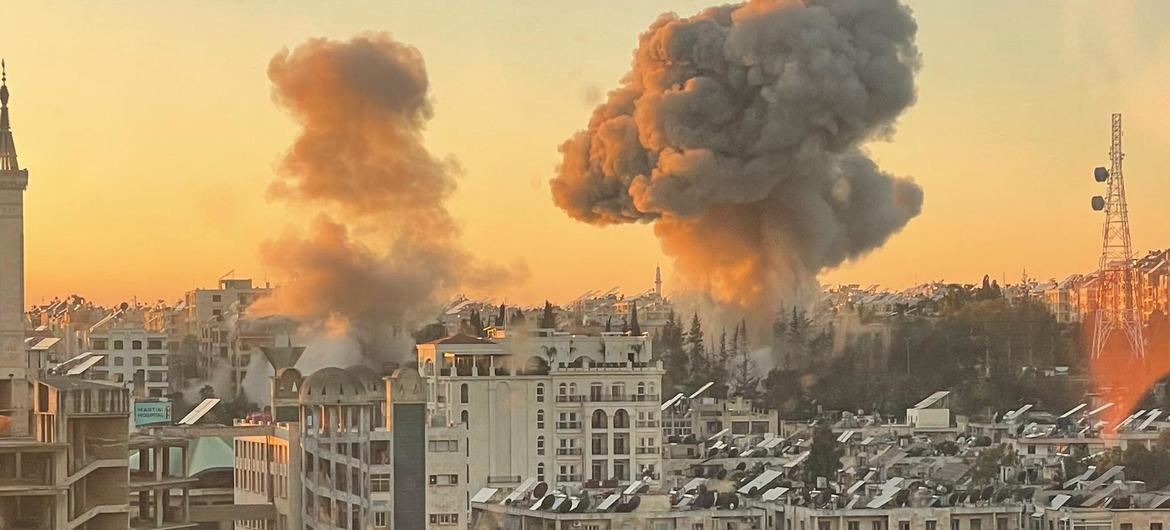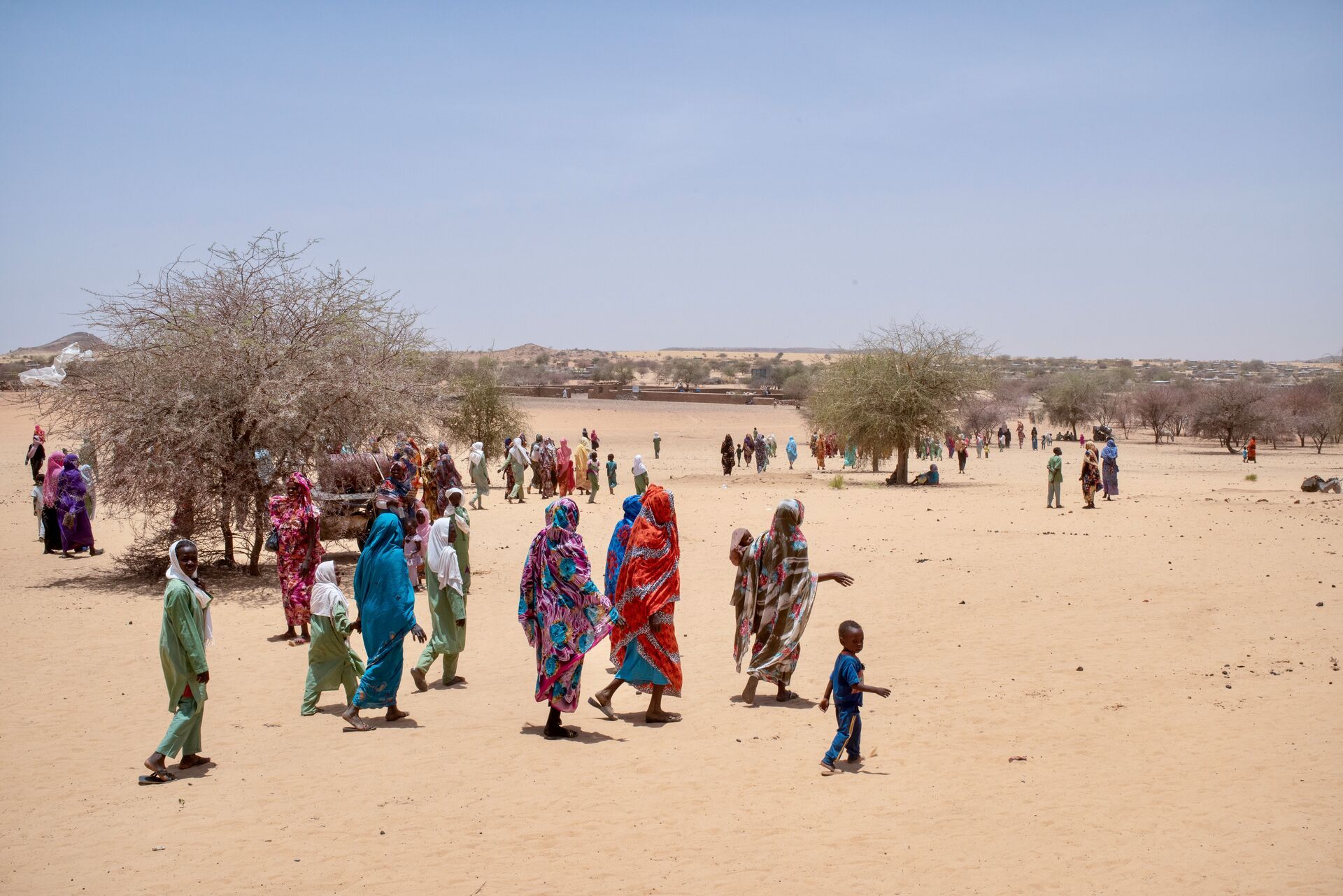
View of Aleppon in December 2024. Photo source: OCHA
Damascus/Washington/New York/Tehran/Moscow: After 14 years of conflict, Damascus today fell to the rebels ending President Bahar al-Assad’s regime. While the opposition forces declared victory overnight on State television, Moscow said following his talks with “a number of participants” in the armed conflict in the Syrian Arab Republic, Bashar al-Assad decided to step down as the Syrian President and leave the country, instructing the government to transfer power peacefully.
Syrian Prime Minister Mohammed al-Jalali has been appointed caretaker to oversee state institutions. He stated that he will cooperate with any leadership elected by the Syrian people.
Syria for the last 14 years was a theatre where all major powers of the world were performing under some pretext or the other, making it a crisis state that witnessed bloodshed and agony for its people.
Also read:
- Syria bloodshed: Hay’at Tahrir al-Sham seizes Aleppo; moves to Hama
- Decade-long Syria conflict is the biggest failure of the United Nations
- With no respite in sight for war-ravaged and pandemic-hit Syrians, UN agencies seek international support
- Children biggest casualty of landmines, explosives, unexploded ordnance in Syria
- Myanmar and Syria expose the United Nations’ limitations
- Does the latest UNSC resolution indicate a thaw in global politics vis a vis Syria?
- Syrian government now controls 90 percent of the country’s territory: Putin
“In this regard, the Russian Federation maintains contact with all Syrian opposition groups,” the Russian foreign ministry stated.
Moscow claimed Russia was not a party in those negotiations. “However, we call on all the parties involved to renounce the use of violence and resolve all governance issues through political efforts,” the Russian foreign ministry stated, adding that in this regard Moscow “maintains contact with all Syrian opposition groups”. Besides, the Russian military bases in Syria were on high alert and there was “no serious threat to their security at the moment,” it claimed, adding that additionally, Russia was taking all necessary measures to ensure the safety of our citizens in Syria.
In Washington, the United States Secretary of State Antony J. Blinken said the Syrian people “finally have [a] reason for hope”. He added, “The Assad regime’s refusal since 2011 to engage in a credible political process and its reliance on the brutal support of Russia and Iran led inevitably to its own collapse”.
While the US would be “closely monitoring developments as they unfold”, it would engage with its partners in the region to support international efforts to hold the Assad regime and its backers accountable for atrocities and abuses perpetrated against the Syrian people, including the use of chemical weapons and the unjust detention of civilians such as Austin Tice.
Also read: UNSC debates Syria’s non-compliance with chemical weapons convention
“We have taken note of statements made by rebel leaders in recent days, but as they take on greater responsibility, we will assess not just their words, but their actions. We again call on all actors to respect human rights, take all precautions to protect civilians, and to uphold international humanitarian law,” Blinken said.
Iran said that it will adopt appropriate approaches and positions as necessary after taking into account the actions and conduct of key players in Syria’s political and security landscape. Emphasizing Syria’s role as an “important and influential” country in West Asia, the Iranian foreign ministry said Iran will closely monitor developments in Syria and the region and “will spare no effort” to help establish security and stability in Syria. “To this end, it will continue consultations with all influential parties, especially those in the region,” it stated.
The sudden offensive by the the Hay’at Tahrir al-Sham (HTS) rebels, since November 27, 2024, uprooted more than 280,000 people in north-west Syria, aggravating the humanitarian situation there. As per the United Nations World Food Programme estimates, over 12.9 million people in Syria needed food assistance before the latest crisis
The rebel group, which the Security Council sanctions as a terrorist group, first took control of Aleppo and its airport, and then Hama, the fourth-largest Syrian city, before finally taking over the Syrian capital Damascus.
In New York, the United Nations Secretary-General António Guterres said that after 14 years of brutal war and the fall of the dictatorial regime, today the people of Syria can seize a “historic opportunity to build a stable and peaceful future”.
Bashar al-Assad as the President ruled Syria for 24 years from 200-2024. Before this, his father Hafiz al-Assad had ruled Syria for 30 years.
The strength of one of Bashar al-Assad’s supporters, the Lebanese Hezbollah, which used to send it’s fighters to support him, has considerable weakened in recent times because of Israel’s strikes on their forces in Lebanon. Among his His other supporters, Iran itself is on the verge of war with Israel while Russia supported him for the past few days and carried out air strikes against rebel groups in Syria, but due to the war with Ukraine, it also could not help Assad like before.
Guterres said while the future of Syria is a matter for the Syrians to determine, “We will need the support of the international community to ensure that any political transition is inclusive and comprehensive and that it meets the legitimate aspirations of the people of Syria, in all their diversity”.
Guterres asserted that Syria’s sovereignty, unity, independence and territorial integrity must be restored. He added: “There is much work to be done to ensure an orderly political transition to renewed institutions. I reiterate my call for calm and avoiding violence at this sensitive time, while protecting the rights of all Syrians, without distinction.” He noted that the inviolability of diplomatic and consular premises and personnel must be respected in all cases in accordance with international law.
The United States stated it “strongly” supports a peaceful transition of power to an accountable Syrian government through an inclusive Syrian-led process. “During this transitional period, the Syrian people have every right to demand the preservation of state institutions, the resumption of key services, and the protection of vulnerable communities,” Blinken said.
Iran said it “continues to support international mechanisms, particularly UN Security Council Resolution 2254, in pursuing the political process in Syria”, and also asserted the need to preserve the sanctity of religious sites in Syria and safeguard diplomatic and consular facilities in accordance with international legal principles.
Russia, too, urged “all the parties” to respect the opinions of all ethnic and religious groups in Syrian society.
“We strongly support efforts to establish an inclusive political process based on Resolution 2254, unanimously adopted by the UN Security Council. We hope that these approaches will be taken into account by the UN and all stakeholders, including in the context of implementing UN Special Envoy for Syria Geir Pedersen’s recent initiative for urgent inclusive intra-Syrian talks in Geneva,” Moscow stated.
Earlier in the day, the the US had announced that Under Secretary of State, John Bass would travel to Amman, Jordan, December 9-10, 2024 where he was also scheduled to discuss with senior Jordanian government officials the importance of protecting civilians and members of minority groups in Syria, and the need for a Syrian-led political solution, in line with UN Security Council Resolution 2254.
– global bihari bureau




